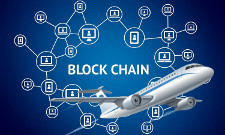Boeing Seeking New Ways to Use Blockchain Technology
Date Written: December 19 2017 Written By: Kyle David One of the biggest aircraft manufacturing companies in the world, Boeing, is in the process of finding new ways it can utilize blockchain technology to assist with its in-flight GPS receivers, that is if its new patent filing by the USPTO is anything to go by.
One of the biggest aircraft manufacturing companies in the world, Boeing, is in the process of finding new ways it can utilize blockchain technology to assist with its in-flight GPS receivers, that is if its new patent filing by the USPTO is anything to go by.
Through a patent that was released by The US Patent & Trademark Office on Thursday 14th December 2017, Boeing gave a full detail of an onboard backup as well as an anti-spoofing GPS system, which they are planning to unveil. The world’s most popular airliner plans to use that particular technology to help if by any chance the primary system of a plain becomes non-functional or fails completely. GPS spoofing is a great system that allows a number of counterfeit signals to be used for the purposes of tricking other receivers.
An attack of that kind can be applied to confuse a GPS receiver based on the real location of other objects. According to this application released by the US Patent & Trademark Office, which is the creator of world’s most used airliner details, the blockchain data will act as a backup record of information if by any chance the anti-spoofing system notices certain serious problems in the system.
The method will go ahead to determine if the GPS information that has been sent to the GPS receiver are tricked or imitated signals. After that, it will then get the position data from the storage module of the blockchain to determine if the GPS receiver is receiving spoofed GPS signals or is not receiving any GPS signals.
The backup will play a number of roles, but key among them is to ensure that the environmental information is safely stored. This is the information that is obtained from the GPS. By doing that, it would be acting as a goofproof to ensure that the pilots are not lost simply by offering them all the information that would be typically obtained from a GPS. According to the application, this system can work in other types of vehicles; the manned and even those that aren’t manned.
Similar Attempt in the Past
It is imperative to note it is not the first time such patent filing has been made. Similar filings were made from the General Electric in November 2017 in a bid to use blockchain as a system for maintaining and monitoring aircrafts.
Each of the five applications that the USPTO published from the General Electric appeared to dwell on a concept for a wider optimization system that would introduce several aspects of operating and managing aircraft. According to that application, one fundamental component of the said system would be to introduce working mechanisms for the process of aircraft oversight.
Even though the entities would be naturally paid using the normal finance channels, the application hinted that cryptocurrencies or other blockchain applications should be used to facilitate such payouts. The same is expected to happen with the new patent that has just been filed by Boeing, one of the most coveted airline conglomerate. The delivery of cash flows to the senior stakeholders would however be done by using traditional credits and debits into financial accounts.
The application went ahead to clarify that the system would be implemented with a mechanism of cryptocurrency that has a core logic backed up by a simple allocation of cash flows. It should also be remembered that Air France also revealed that it was looking forward to starting using blockchain as a means of tracking the flow of maintenance for all its airplanes.
Going by this statement that was made at the beginning of 2017, it becomes evident that technology could be used to establish a shared database of update information. Back to the latest news on the table, the Boeing’s new application appears like a system that has been created to fill in the gap for a better fail-over technology.
At the moment, both the aviation and automobile industry does not have a reliable system that can be used to verify data about the location of either a plane or a vehicle. This can cause a big problem should anything go wrong in these two industries. For instance, if a GPS platform, unfortunately, encounters a spoofing attack or an outage, fixing it in real time would be a tragedy. Air traffic controllers, navigators, mission planners and other professionals in this area will be unable to adjust and respond within the shortest time possible.
If this application by Boeing goes through, GPS spoofing will come to an end, with the assistance of blockchain technology.



